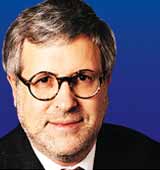As I have mentioned in the article
(and in the previous answer), the
unpleasant characteristic is that too
many senior managers are distant
from and even uninterested in
operations and blind to its potential.
The reason for this is that many of
them have risen to senior ranks with
minimal operational experience.
-
How should the need for
operational innovation be identified?
Who should spearhead operational
change initiatives? Should it be the
CEO or Departmental Heads or
Divisional Heads or respective
Functional Head?
Any company needing to sustain or
create an advantage in a tightly
competitive industry should consider
operational innovation. The effort
needs to be led by a senior executive,
though not necessarily the CEO. The
CEO needs to encourage the effort, but
we find it best that the actual efforts be
led by line business executives and
supported by specialists with
expertise in the field.
-
What's the best way to foster
operational innovation in
companies? Should it be driven by
top-down approach or bottom-up
approach? Which of these two
approaches would extract
"passionate commitment" from
employees across the organization?
Bottom-up is unlikely to be effective,
since operational innovation requires
a broad perspective on end-to-end
business processes, which front-line
people are unlikely to have.
Operational innovation requires both
the authority and broad point of view
that only senior executives possess.
Does corporate entrepreneurship
play any role in fostering operational
innovation? What should be the other
institutional incentives to be
organized for better operational
innovation results?
Corporate entrepreneurship is a good
thing, but not the same as operational
innovation. The former is more
focused on creating new businesses,
the latter on finding new ways to
operate in existing businesses.
Operational innovation does need
incentives and supportive leadership,
just like any other change effort.
What's the importance of
performance goals / targets in
operational innovation?
They are absolutely required.
Without them, no one feels a need to
make deep change and reinvent how
operations are performed. They need
performance goals that cannot be
achieved with the current process to
induce them to come up with
something new.
What's the importance of execution
in achieving the desired results of
operational innovation? What are the
challenges in implementation?
Even the finest and most innovative
concept is of no value unless it is
implemented. Implementing
operational innovation, however,
requires a new approach to
implementation, one based on
learning and iteration rather than
precise planning. Operational
innovation is at its heart a form of
innovation, which is, by its nature,
characterized by uncertainty.
How to overcome organizational
inertia to make operational innovation
a way of life?
Rapid early success with
organizational innovation is the first
step to overcoming inertia; when
people see that the approach works,
they become less skeptical. It is
important for the leadership team to
publicize early results and make a
public commitment to continuing and
extending them. It is also powerful for
the senior executives to make public
commitments to quantified
performance improvements that
cannot be achieved with traditional
modes of operation and so demand
innovation.
What are your suggestions for
accelerating operational innovation
efforts?
First, the senior executives must set
aggressive time schedules in terms of
when results are required. Second,
those doing the work must adopt a
new style of implementation, which
foregoes detailed and lengthy
planning in favor of iterative
implementation, in which early
results are quickly achieved and
subsequent releases built on these.
